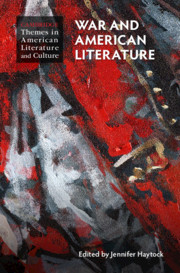Book contents
- War and American Literature
- Cambridge Themes in American Literature and Culture
- War and American Literature
- Copyright page
- Contents
- Contributors
- Acknowledgments
- Chronology
- Introduction
- Part I Aspects of War in American Literature
- Part II Cultural Moments and the American Literary Imagination
- Chapter 8 Liberty, Freedom, Independence, and War
- Chapter 9 Indians, Defeat, Persistence, and Resistance
- Chapter 10 Civil War Literature and Memory
- Chapter 11 African American Literature, Citizenship, and War, 1863–1932
- Chapter 12 World War I and Cultural Change in America
- Chapter 13 On the Home Fronts of Two World Wars
- Chapter 14 Patriotism, Nationalism, Globalism
- Chapter 15 The “Good War” Script
- Chapter 16 The Vietnam War and Its Legacy
- Chapter 17 The Forever Wars
- Part III New Lines of Inquiry
- Further Reading
- Index
Chapter 14 - Patriotism, Nationalism, Globalism
from Part II - Cultural Moments and the American Literary Imagination
Published online by Cambridge University Press: 20 January 2021
- War and American Literature
- Cambridge Themes in American Literature and Culture
- War and American Literature
- Copyright page
- Contents
- Contributors
- Acknowledgments
- Chronology
- Introduction
- Part I Aspects of War in American Literature
- Part II Cultural Moments and the American Literary Imagination
- Chapter 8 Liberty, Freedom, Independence, and War
- Chapter 9 Indians, Defeat, Persistence, and Resistance
- Chapter 10 Civil War Literature and Memory
- Chapter 11 African American Literature, Citizenship, and War, 1863–1932
- Chapter 12 World War I and Cultural Change in America
- Chapter 13 On the Home Fronts of Two World Wars
- Chapter 14 Patriotism, Nationalism, Globalism
- Chapter 15 The “Good War” Script
- Chapter 16 The Vietnam War and Its Legacy
- Chapter 17 The Forever Wars
- Part III New Lines of Inquiry
- Further Reading
- Index
Summary
This essay considers the literary and, more broadly, cultural memory of World War II in the later Cold War years. It contends that the ideals associated with patriotism, nationalism, and globalism, while often colliding and contradictory, were not just rivals in the discourse of the era but divisions of affiliation within the everyday citizen’s outlook toward self and world, within the ideological braid that commentators referred to as one’s multivalent “character structure.” The various guiding logics of that knotted cluster would come to be called Cold War liberalism. Its outlook valorizes both an inward-turning retreat into radical individualism on the level of the atomistic, autotelic self arrayed, and against a pugnacious outlying dimension – cosmic in scale, physical and metaphysical – of tragic and unchanging global conditions: the epistemological stasis of the Cold War’s “containment” rationale.
- Type
- Chapter
- Information
- War and American Literature , pp. 209 - 223Publisher: Cambridge University PressPrint publication year: 2021

